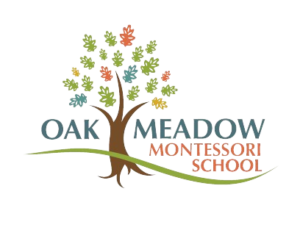Students present real community solutions during shark-tank-like event
“Your presentations today blew us away!” Those were the words used by Francey Slater (co-founder) and Jessica Wilson (Executive Director) of MiIl City Grows, after watching the shark-tank-like presentations this week by middle school students from Oak Meadow.

One team makes their final presentation at the shark tank
“I am amazed by what you accomplished in just one month” Francey added, “You were able to develop genuine insights about the history and context of Lowell, the culture of our organization, and the challenge of providing access to fresh produce; and then bring that into focus with six very different and creative solutions–that is truly impressive. In fact, your solutions in many ways are more relevant and easier for our organization to adopt than some of the ideas we’ve heard from university graduate students.”
The presentation this week was the culmination of an intensive, comprehensive, month-long project that was incorporated into Mrs. Fox’s middle school humanities class. Students read “The Omnivore’s Dilemma,” and applied what they learned to a real-life challenge in the community. Specifically, they worked in partnership with Mill City Grows to address issues related to access and education about healthy, fresh food for the citizens of Lowell.

Developing skills in effective teamwork
Students worked on six different teams. Each team had to leverage the skills of each of the other team members, work collaboratively, and develop a unique solution to the problem. Learning how to work effectively in a team was one of the primary goals of this project.
Thinking like entrepreneurs, students learned how to develop ideas and solutions that are sustainable and scalable. They learned how to use tools like the business model canvas (BMC), which includes an understanding of the interrelationships between customer segments, the value proposition, customer channels and relationships, key resources and partnerships, and cost and revenue structures. Students were required to use the business model canvas to assess their own understanding of the problem and the validity of their proposed solution.

Learning how to interview customers on the street
Research skills were also an integral part of the project. Students were expected to deeply understand the nature of the problem being addressed, as well as understand the economic and demographic context of the community. Students did a case study to learn more about solutions that have proven effective in another city.
All of the students participated in two trips to Lowell to conduct interviews. During the first visit, it was an eye-opening experience for students to walk up to people they had never met before, and ask if a stranger would participate in an interview. Preparing for this experience included learning how to ask questions that encouraged people to share their stories and provide the level of detail that would help students gain clearer insights. The second visit to Lowell provided additional opportunities for students to validate their assumptions about the problem and test their hypothesis about possible solutions. Following the second visit to Lowell, students had to figure out how to adjust their hypothesis based on the interviews and data collected.

Francey Slater and Jessica Wilson talk with the students at Mill City Grows
Finally, the teams had to work together to create a professional presentation to make in front of Francey Slater and Jessica Wilson, as well as parents who would be attending the shark-tank event. Each team had only seven minutes to make a compelling case, incorporating their definition of the problem, understanding of the local context, proposed solution based on facts and evidence, implementation plan including necessary resources and partners, expected impact on customers and the community, and an analysis of the cost and revenue structure of their solution.
Although the students did develop several very practical solutions, the real goal of this project was to help students develop a deeper understanding of the academic curriculum through a real-life application, as well as to develop their practical skills in critical thinking, problem solving, and teamwork.
Thank you to the many individuals at Mill City Grows (Francey Slater, Jessica Wilson, Brian Mariano, Giuliana Cappucci, and Enrique Vargas) and the Cambodian Mutual Assistance Association (Sovanna Pouv and staff) for supporting the students and this project. Thank you to the middle school faculty for providing the support and schedule adjustments necessary to allow us to implement this program. Thank you to Doris Korda and the Korda Institute for Teaching, for ongoing guidance and support in course planning and implementation.





